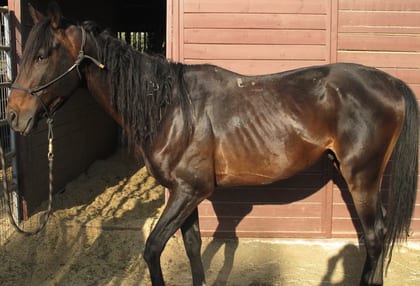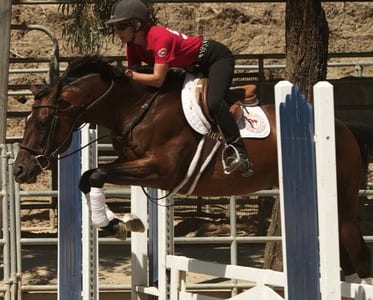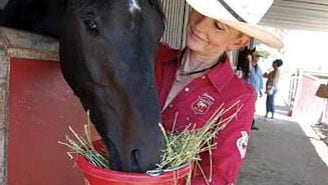Nearly seven years ago, horse lover, Susan Peirce of Chino Hills, California found a starving thoroughbred filly at a run down and dilapidated farm. Although it was clear that the horse had been beaten and abandoned, the barn manager did not feed her since he wasn’t being paid. Instead, he was planning on sending her to the slaughterhouse.
Unable to turn her back, Peirce went to the local feed store and bought 50 pounds of carrots and a “Red Bucket.” It took Susan six and a half hours to catch the emaciated filly. Peirce named her Harlow, nursed her back to health and found her a forever home.
The next year, Peirce returned to same farm where she found nine additional abandoned horses. Again, the barn manager was not feeding them, and they were clearly starving. One horse in particular was endangered, so Peirce, along with a friend, spent the next 36 hours trying to save her.
Unfortunately, she was so sick the vet recommended they euthanize her. Peirce named her Gracie, and that was the defining moment that changed her life. Looking around at the eight remaining horses that were also suffering, Peirce decided she had to do something and Red Bucket Equine Rescue was born. Eight more Red Buckets were purchased, and eight additional promises of second chances were made.
BEFORE
 In a very short time, Red Bucket developed a very strong track record of rehabilitating and training their horses. As their reputation grew, they also began to re-home many of the horses, finding forever homes. Adopters came from Colorado, Wyoming, and Oklahoma in addition to local Southern California communities.
In a very short time, Red Bucket developed a very strong track record of rehabilitating and training their horses. As their reputation grew, they also began to re-home many of the horses, finding forever homes. Adopters came from Colorado, Wyoming, and Oklahoma in addition to local Southern California communities.
 The amazing transformations of hundreds of abused horses are only possible through the generosity of others who wish to help. The Red Bucket Team and the horses that they serve are deeply grateful for the donations that make their meaningful work possible. (After rehab picture shown of Finbar jumping (left)–Yes–that is the same horse. We checked twice!)
The amazing transformations of hundreds of abused horses are only possible through the generosity of others who wish to help. The Red Bucket Team and the horses that they serve are deeply grateful for the donations that make their meaningful work possible. (After rehab picture shown of Finbar jumping (left)–Yes–that is the same horse. We checked twice!)According to Peirce, “Every five minutes an American horse of all breeds ends up at slaughter. Ninety-two point three percent (92.3%) of these horses are healthy horses in good condition, including former family pets, show horses, donkeys, foals and pregnant mares,” Peirce states. “We hope that your readers will consider adopting a horse through Red Bucket or they can also make a much needed donation to Red Bucket to help rescue, rehabilitate and care for these horses while they are waiting for their forever home.”







